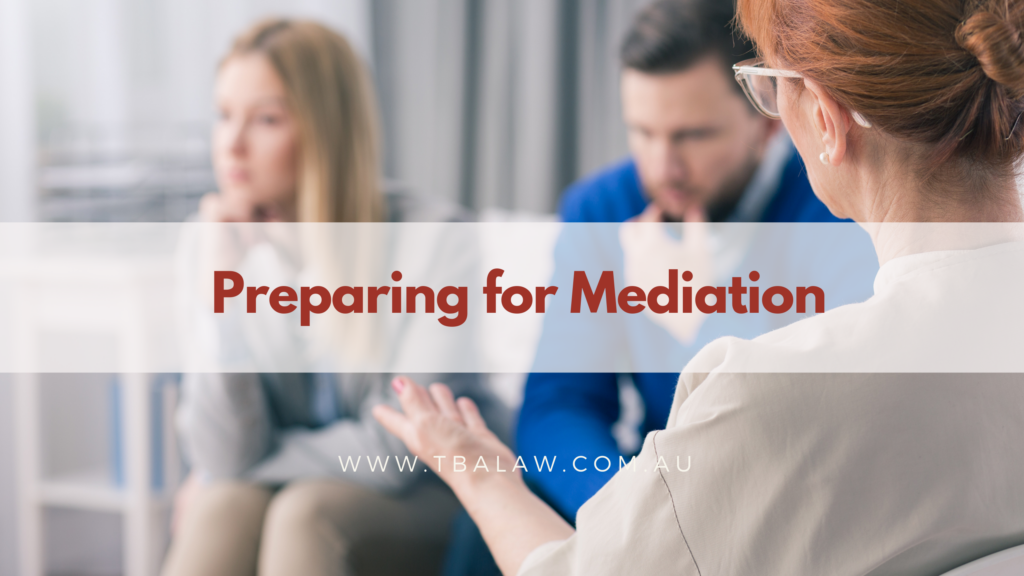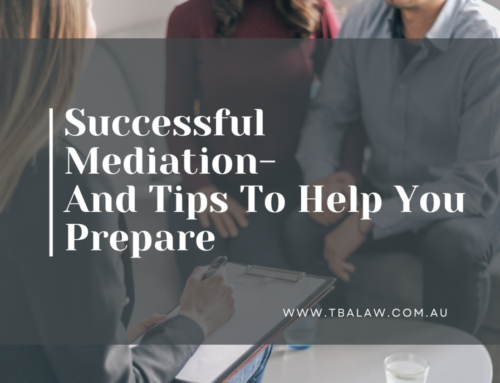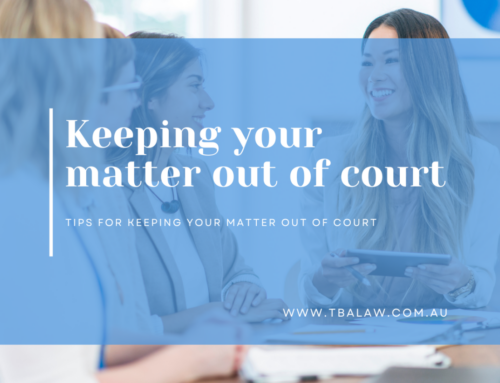Preparing for Mediation
Mediation is a great way to prevent conflict from escalating and it has a very high success rate; however, if you don’t prepare well for it, the process can be very different to what you’d expect. Before you head into a mediation, it’s important to prepare yourself well.

Early stage vs late stage mediation
The first thing that you should know is that the experience will depend on how far along your dispute is when you get to mediation. The earlier you try and do mediation, the more likely you’ll be able to resolve your dispute and issues won’t escalate as much as they could in another six months down the track. Issues are potentially going to be more finite as well, rather than a whole lot of things being built up over time. You may feel some pressure and stress, but there’s no external pressure or stress that’s forcing you to settle for something you don’t want—so you’re within your rights to decline an offer during mediation. Early stage mediation without lawyers present is probably better than late stage mediation which is usually court ordered.
Late stage mediations have a lot of pressure and aren’t great experiences. They can be very stressful. You might be feeling like you have less control than if you did an earlier stage one, but the thing to bear in mind is that it’s actually all in your hands. The outcome of a mediation is all up to you. The problem with a late stage mediation is there are lots and lots of consequences to think about and weigh up versus early stage mediation. Hence, trying earlier is always better! At the late stage, final court ordered mediation, you have far fewer options. The parties are much more limited in their ability to negotiate, and they cannot go back to the drawing board if they don’t like what happens at mediation.
If they do not reach an agreement during this phase, the case will go on to trial preparation—and that’s a whole new ballgame.
Know the process
What are some of the things to prepare? Taking out some of the uncertainty of the day can help you prepare. Now, a lot of mediation follows a very structured process. You’re going to have, at the very beginning, at chance for both of you to say your piece, the mediator will ask some questions, and that’s at the very beginning. You will more than likely also get a chance to talk the mediator separately. But a lot of it will be you, the other party and the media that are working on options, and discussing various different solutions that might work for you.
A late stage mediation will probably end up being more like a shuttle style. Because by that point, it’s unlikely that the mediator will keep you in the same room; it’s more likely that they’ll bounce backwards and forwards between each other to bring offers and work on solutions.
Now, as I said, the outcome of the mediation is in your hands. The mediator is not a judge, the mediator is not there to give you solutions or options. It is up to you to come up with the options and what solutions fit the best.
Try and manage your stress level
One thing to prepare for mediation is to understand that if you feel overly stressed, you can ask for a short break. So have some kind of phrase ready, like “I just need to go to the bathroom.” or “I just need to go and get a drink.” so that when you do become anxious during the mediation, you know what to come back to.
When preparing for a mediation, make sure to bring food and drink. Your brain works better when it has sugar and nourishment, so if possible, bring some food or a beverage with you while you do the mediation in case you need to take a break from thinking about what’s happening during this stressful time in your life. You’re going to have to make some hard decisions, so be sure you have enough energy for them to work out well for everyone involved.
If you’re feeling stressed, it can be helpful to have some tools on hand that you know will help you take a break from stress.
One thing you might try is taking a walk, going to the toilet, or getting a drink of water. Sometimes these things are enough to snap your brain out of stress and get it back into its normal state.
It could help to think about what kinds of scents or other sensory experiences might help lower your stress levels. . If nothing else, it’s good to have something in mind that makes you feel more relaxed when you need it most! You can also try one of those wrist bands that snap when they hit against each other—some people find this helps them snap out of their stressful state.
Be prepared to listen
The other thing to prepare for in mediation is to listen. Now, I know that when you go into mediation, you’re all about, “Well, this is what I want, and this is what I need to say, and this is what I need to get across,” and all these sorts of things. However, listening is sometimes the superpower in dispute resolution. Being able to listen, firstly, you could learn something that you could use in the negotiation if you’re listening. Secondly, if you want to feel like you are heard, the other person probably wants to feel like they’re heard as well. So if they feel like they’re heard, it can bring their levels of stress and anxiety down, and therefore, make them more willing to want to settle, which is where you want them to be.
Hopefully, I’ve been able to provide you with some helpful advice for getting the most out of your mediation experience. Mediation takes time, energy, and patience—and sometimes all three of those things can run out before we reach an agreement. As I said before, the sooner you can have the mediation, even without lawyers involved, even better. Once lawyers are involved, it starts escalating. And then the longer it goes on for, the more it escalates until it gets up to court-appointed mediation. And that’s just much more stressful. There’s a lot more pressure at that point. So resolving it earlier is better.
Jacqui Brauman is an NMAS Accredited Mediator, and a Collaborative Practitioner for Wills and Estates. She is trained in several alternative dispute resolution modalities, through Resolve Estate Law, the Mediation Institute, AACP, and College of Law.





Leave A Comment